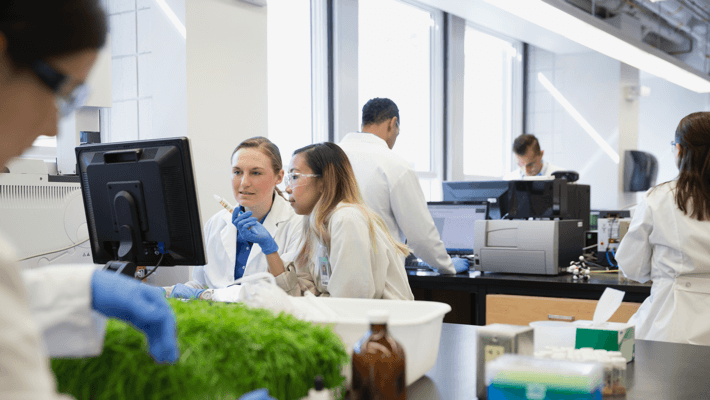Content management error: Header Banners should not be placed in the Navigation placeholder!
Life Sciences and Chemicals
The Life Sciences and Chemicals industry is at the start of an exciting and unpredictable period of rapid development. The digital revolution has made inroads across Pharmaceuticals, Biotech and Agri-food.
Content management error: Generic Content Banners should not be placed in the Navigation placeholder!
These changes aren’t just reducing costs and increasing margins.
They're improving and saving lives across the world.
Content management error: Generic Content Banners should not be placed in the Navigation placeholder!
1. Big-data Biotech
Potential uses could bring vast improvements in the way potential research targets are screened and how cures are found.
Big Data will become an increasingly important aspect of clinical trials. Processing and analysis of the huge amounts of data that life provides, at speed, connecting devices for remote trial monitoring and cloud-based trials all require sophisticated Life Sciences and IT integration.
Our versatile scientists and IT experts can define the right data management necessary to achieve your goals.
Content management error: Generic Content Banners should not be placed in the Navigation placeholder!
2. Changing regulatory environments
The global and national regulatory landscape is shifting. Navigating new changes like the Identification of Medicinal Products programme for pharmaceuticals demands detailed knowledge of the products as well as the regulations themselves.
Phased implementations, data requirements for different elements (for example ingredients and clinical particulars) and how to maintain operational efficiencies all require careful consideration.
Meanwhile, the EU’s General Data Protection Regulation imposes stricter obligations on how data is collected, processed and used. This impacts how businesses expand datasets, how research and development is conducted and how products are marketed.
We can partner with you to navigate this environment. Our technical writers excel at writing for packaging, inserts, and presentations to both governments and wider audiences. We can provide researchers or undertake observational studies on your behalf, onshore, nearshore or offshore. Throughout, we appreciate both the science and compliance behind ensuring your success.
Content management error: Generic Content Banners should not be placed in the Navigation placeholder!
3. Assisted Farming

Farming is particularly reliant on transient and insecure labor. The work is hard, repetitive and carried out in all weathers. Enter: robots and drones to help ease the burden.
Agricultural machinery, like cars, are on the road to full automation. Robots will pick and carry fruit and vegetables through the fields during the day and shine ultraviolet light on leaves at night to eradicate harmful organisms. Drone-like robotic ‘bees’ will automatically detect and pollinate plants. Wastage will be reduced as produce is only picked at the perfect moment.
Given the remote nature of much agricultural land, local communications networks will have to be established, connect the wider Internet of Things. AIs will need to be developed to control and improve our robotic assistants.
A blend of thinking in Life Sciences, IT and Engineering will be required to develop the farms of the future. We can connect specialists from all three sectors to understand what works best for crops, design and prototype the necessary tools and create and manage the software underpinning your assistants.
How Modis can help
We don’t just find the brightest minds in the world to connect them with your business; we partner with you to find solutions to your challenges.
- Pre-clinical research
- Clinical studies
- Submission and approval
- Pricing & reimbursement
- Manufacturing
- Go to market
- Healthcare
Content management error: Generic Content Banners should not be placed in the Navigation placeholder!